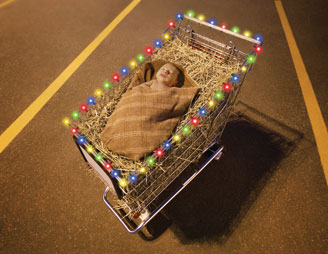
Any article on ethical shopping has to say at the outset that our current shopping patterns are destructive. But this is obvious. I would add that it’s our consumer mentality that is killing us.
The challenge is to break free from the notion that we are individual spending units, which is how most economists and retailers see us. The script is too narrow: wake up, drive in traffic, work at an unfulfilling job, make money, go shopping, buy things to make us happy for a while, repeat. This breaks our connection to other souls around the globe and separates us from the natural world.
This is why I was part of a group that started a campaign several years ago called Buy Nothing Christmas. Most people automatically think this means I practise a give nothing Christmas, assuming that if you don’t buy Christmas gifts you have nothing to give people.
See? That’s how the consumer mentality works. If you don’t buy something, you don’t have anything to give. But each of us has something to give that is both enlivening for us and sustainable for the economy and environment.
We can give of our ability to bake a cake, cook a meal, look after children, make a photo album, sew, work with wood, record a song, write a story, plan a celebration, darn socks, make jam, can peaches. With some practice and an injection of fresh ideas, we can shift from being “consumers” to being “conservers” or “producers.”
Freedom for All
We live with a near-total domination of the consumer mentality in our society. It structures our economy and biases virtually all of the information in the media. The Church is in a unique position─because of its non-commercial roots and justice-oriented Leader─to offer a prophetic word to this culture. It speaks the language of an alternative consciousness where there is justice and freedom for all, including, for example, the workers who make t-shirts and jeans in clothing factories in far-off lands.
My understanding of the gospel of Jesus Christ is that it affects both the human heart and the structure of the human community. This gospel is decidedly critical of our current social and economic system in which our main duty is to go shopping. This same gospel is also energizing, calling us to new patterns of living. These new patterns will of course be more difficult. But with the difficulty also comes the promise that brings hope, provides new energy and elicits the song of praise.
Ten Shopping Alternatives
We can bring hope to the world as we modify our shopping habits. Because the established order maintains its oppression through the compliance of consumers, we can embody an alternative as we resist the typical consumer options and explore alternatives. Here are some of my suggestions:
1. Make the item yourself. This simple act of self-reliance is heresy in a consumer society. For example, why would you make gifts for nieces and nephews (as I do for 18 kids each Christmas) when you could buy them cheaper at the store? So that you can avoid the standard consumer solution, which promotes the lowest possible wages and endless desires.
2. Find someone else to make it. As we turn to others and exchange talents, we build community and bypass a destructive economy. For example, I got two loaves of fresh brown bread as “payment” for servicing the computers at a friend’s place.
3. Scrounge for items. Fetching things from the dumpster is repulsive to standard consumers, who often defend an economic model premised upon waste. I have found treasures in the trash—wood for Christmas projects, a CD player for our stereo and expensive vacuum cleaners.
4. Barter for items. This bypasses the need to buy new and can be a more local, accountable economic activity. Some communities even have “barter bucks” or an equivalent.
5. Buy things used. Nearly new, second-hand, pre-owned—it doesn’t matter what you call it. When you buy things used, it keeps goods in circulation longer.
6. Research the company. Look for poor labour relations, loose environmental protection standards, toxicity of materials. Then report problems in a letter to the store or manufacturer. For assistance, look up “ethical shopping” on the Internet.
7. Buy local and regional goods. Seek out and pay extra for items made locally. This supports neighbours, minimizes transportation needs and decreases demand for offshore products.
8. Pursue fair trade. Choose items from producers who pay workers a fair, or at least a living, wage. Look for fair-trade labels; read them carefully, research as needed.
9. Unbrand. Be mindful of the role brands play; they promote status based on appearance. Consider taking off or covering up labels on items you buy. Defacing labels is an overt acknowledgment of the inordinate role they play in our lives and in the marketplace.
10. Grace and complexity. Recognize there’s no clean solution in this inter-connected, global economy, but we should each do what we can.
Aiden Enns is the publisher of Geez magazine and a co-founder of BuyNothingChristmas.org. He lives in Winnipeg and can be reached at aiden@geezmagazine.org